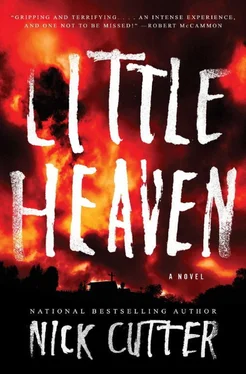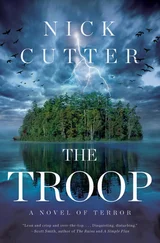They returned to the car. Micah drove to the cut. The old trail was still there. Micah popped the trunk. They unloaded their gear: a rifle, sleeping gear, a lantern, and flashlights. Minerva handed Micah his backpack from the trunk. Its weight surprised her.
“What you got in there, Shug? Pet rocks?”
They shouldered their packs and made their way through the long grass to the head of the trail. They had to move slower on account of Ebenezer’s limp.
The sun hung above the western hills, shining with a dull glow that cast no shadows. The air was still, but a sweet breath came from the woods rowing the hillside: a mild note of camphor. The twittering of birds, too: only a few, but at least some animals were about. The path followed a gradual rise. They could spot no signs of the old fire. Everything was thriving, in fact.
Minerva twisted the cap off her Dr Pepper. Ebenezer broke into a commercial jingle as he limped along.
“ I drink Dr Pepper, don’t you see ,” he sang in a redneck twang, “ as it’s the perfect taste for meeeee…”
“Whatever you paid for singing lessons, it was too much,” said Minerva.
The two of them needled each other simply to hear themselves talk—anything to push away the silence, which had become heavier as they forged deeper into the woods.
They stopped for a rest. The woods did not feel quite as hostile as they had fifteen years ago. Had they actually hurt the thing back then? Micah could not credit that. He wasn’t sure something like that could be injured or killed because he was unsure if it was truly alive. But more than that, it just seemed so ineffably old that, whenever Micah turned his mind to it (which was not often, because even his thoughts scared him), notions of it ever dying seemed farcical. Something like that existed outside the bounds of time and scale—outside human bounds, anyway, and those were the only measurements he could apply.
“Are we ever going to talk about that part of it?” Minerva said. She must have read something in Micah’s face.
“What part?” said Eb.
“Whatever happened down there in the dark.”
“With the…?” Eb started.
“Yeah, the…”
Minerva trailed off. It was hard to say what, exactly, they had been given. Wishes? Is that what happened? Had they been granted wishes, like the old story about the genie in its bottle?
“‘The Monkey’s Paw,’” Eb said.
Minerva nodded. “You read it?”
“A few times,” said Eb. “Seems rather apt.”
“But what…” Minerva grimaced, her brow beetling. “What did we ask for? I don’t remember saying anything. More just something kinda bubbling up from way down inside me. Something I must have wanted real bad. And that fucking thing granted it.”
“Mine’s not so hard to figure,” Eb said. “I wished to see the face of God.”
Ebenezer wiped his nose on his sleeve and took a sip of Yoo-hoo. He stared at them imploringly, as if hoping the other two would understand—intimately, in their marrow, knowing the way he knew. Ebenezer had been so desperately scared. Those moments, in that place beneath the world, had nearly broken him… or had broken him, in a way he was unable to unravel or give voice to or properly grapple with. Like a greenstick fracture of some invisible bone—a vestigial one, the bones we all had as children that fused and changed so that, as adults, we have a different number of them in our bodies. That phantom bone went snap . The cleave was clean and flawless, as if a surgeon had done the work with a bone hammer. And that little bone was unhealable—it was forever broken, the jagged ends grinding together inside his mind. Looking back, Ebenezer was unsure that human minds were built to cope with any of… of what happened down there. He felt no shame thinking that, either, as he did not believe humans were built to come to grips with anything that existed beyond their conventional means of reckoning. When humans experience something that challenges their fundamental belief of the world—its reasonableness, its fixed parameters—well, their minds crimp just a bit. A mind folds, and in that fresh pleat lives a darkness that cannot be explained or accounted for. So they ignore that pleat as best they can—it, and the darkness it holds. But it’s always there, always seeking redress.
“I wanted to see the face of God,” Eb said again. “I must have. I was not a religious person, as you both know. I killed for money. But in that moment, all I wanted was to know there was something larger than myself up there—a benevolent god to protect me. If not my body, at least my immortal soul.”
The men turned to Minerva. She spat into the nettles. Why even speak the words? They must know what she’d asked for: I will never be killed by the hand of a man. Minerva could not say that was her exact wish—she was still unsure, then as now, as to the precise compass of her desires. But look at her now. The past fifteen years. The Sharpening, that most terrible gift. She could kill and not be killed, even by her own hand, much as she might now pray for death. What worth were those prayers? She had made a deal with something as powerful, if earthbound, as any god. Perhaps it was a god of some sort. A dark one. An ancient one. But yes, she must have wished to be cleansed of the fear and anxiety she had once carried into life-or-death encounters. As Micah had said years back, she was not cool in the cut. Her hands always took fright, fluttering like startled chickadees. Minerva figured that was what the vile thing had dredged up. It found that flaw in her, one that shook her straight to her core, and whispered: Oh, my ladylove, my dove, I will make it all better. And it had, hadn’t it? As sure as eggs is eggs. But it had played a dirty trick, too. Well, fuck a duck. You couldn’t expect a thing like that to play fair, could you?
The light was fading between the firs. An owl hooted from a low bough.
“And you, Shug?” Minerva said. “What did you get?”
“Only everything I asked for.”
THEY HIKED UNTIL DUSK.Ebenezer hissed every time he set his foot down. Minerva felt no sympathy for him.
A shape broke through the trees ahead. They checked their strides, approaching cautiously. A solitary shack. Smoke spindled from its chimney. The door was ajar. Light from a potbellied stove threw flickering shadows across its interior.
From inside, there came an ominous sound. Minerva envisioned someone sitting on a whoopee cushion filled with thinned lard: a wet spluttering .
We don’t have to look , she thought edgily. We can walk right on by…
Too late. Micah toed the door open. His eyes fell upon something inside. His knees buckled; he leaned heavily against the door frame. The spluttering sounds were much louder with the door open.
In the firelight flickering through the door, Micah’s face was drawn and haunted. He drew a shuddering breath, then stepped into the shack. Ebenezer hesitantly followed, and quickly saw whatever Micah had beheld.
“I can’t,” Eb said, shaking his head violently. “Oh Christ, no, I can’t, I cannot —”
Borne on a sudsy foam of dread, Minerva advanced to the door. She didn’t want to see, either. But she couldn’t not bear witness.
The cramped shack reeked of blood. The stove, a folding card table, pelts tacked on the walls. Something hung among those pelts—much larger than the coyote and muskrat skins, oh yes. And it was still moving. A paralyzing chill spread down her back, as if liquid nitrogen had been injected into her spinal column.
A man was tacked to the wall. His bare feet kicked weakly six inches above the ground. He had been opened up, his chest split down the middle starting at the level of his clavicles. The skin was peeled back in quivering wings that had been pinned to the log walls with pelt tacks. The silverskin and fascia and yellow adipose tissues had been flensed away with clinical skill; whoever had done it had great facility with a boning knife. The man’s arms and legs had been slit down their middles, the skin peeled back to reveal the shining bone of femur and kneecap and humerus.
Читать дальше












